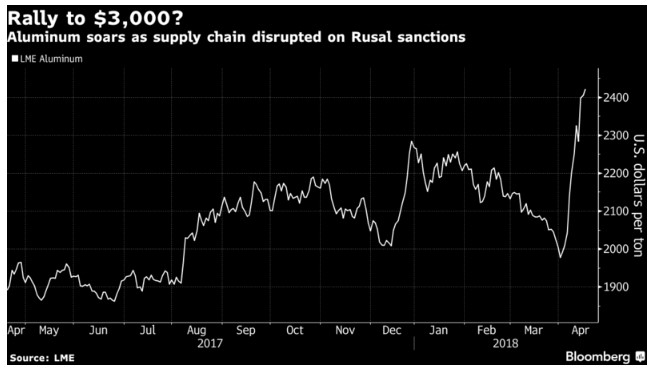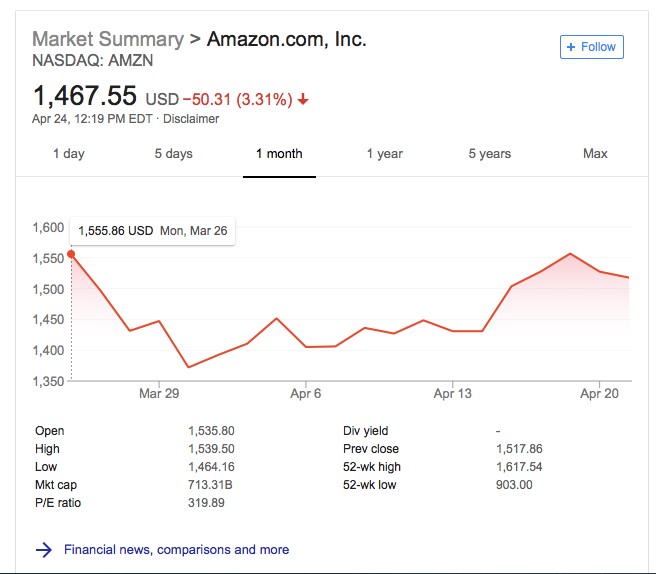If you bought shares in U.S. aluminum companies because of the harsh sanctions Trump slapped on Russia, including its Rusal aluminum giant, you lost dearly unless you dumped them right away, before he had a chance to take a deep breath and walk things back.
So let that be a lesson learned by all of us, in three parts:
#1 Sanctions aren’t always what they appear to be
#2 Trump tweets don’t have legs
#3 What’s good today is bad tomorrow
We’ll take aluminum stocks as a case study, because it’s the freshest in everyone’s mind. This is how it went down:
On Friday, April 6, Trump unleashed sanctions against Russia, targeting a long list of oligarchs, and specifically, the country’s giant aluminum producer, Rusal. By the following Monday, Rusal had lost half its value.
But U.S. aluminum prices soared, and so did stocks in companies like Alcoa and Century Aluminum.

(Click to enlarge)
Goldman predicted that prices could soar an additional 25 percent, predicting they could spike to $3,000 per metric ton. By Wednesday, 12 April, aluminum prices on the London Metals Exchange (LME) had climbed 2.3 percent to $2,460 per ton, the highest since 2011. The day before Rusal’s aluminum had been suspended from the LME.
“U.S. sanctions on Russian oligarchs and the companies that they own or control have dramatically affected the aluminum market,” Bloomberg quoted the bank as saying. “The uncertainty associated with our forecasts is great. In the event that resolutions are not found quickly enough, prices are likely to exceed our forecasts.”
U.S. premiums on aluminum gained 15 percent from April 6 to April 12. As such, Alcoa—the sixth largest aluminum producer in the world—had enjoyed a more than 20-percent share price spike in 30 days thanks to tariffs and sanctions.
But what everyone forgot to factor in was … Trump. Related: Financial Sector Reports Record Profits
On Monday, April 23, he started walking those sanctions back, moving to ease the pain of Rusal. Either he got what he wanted from Russia on another playing field, or he never intended the sanctions to be real, or as harsh as they seemed.
The new deal is that Rusal will have more time to comply with sanctions in the worst-case scenario. And in the best-case scenario, there won’t be any at all because Trump is considering lifting them if the oligarch behind Rusal—Oleg Deripaska—cedes control.
So what was a high-level of certainty over aluminum share prices earlier this month, is now shaky at best, and it’s sparked a massive sell-off.
By Monday, April 23, aluminum prices on the LME had lost 8 percent.
By Tuesday, April 24, Alcoa was a nightmare, having lost 14 percent in its biggest one-day sell-off in nine years on Monday, and down nearly 3 percent more today. As of 12:16 EST, it looked like this:

(Click to enlarge)
And it’s not the only fire sale that has astounded speculators since Trump took over the White House. Trump tweets have also taken their toll on Amazon:

(Click to enlarge)
In fact, the Trump effect on the market has been broad-based, across the board. The tariff back-and-forth has caused the Dow to gain and lose hundreds of points on a whim, trumping (so to speak) even basic fundamentals.
Related:Tech Giants Rally Ahead Of Earnings Reports
The problem is this: We don’t have a handle on fundamentals anymore because there is no clear path for the market. When the world has become a very public negotiating stage that is unfolding on Twitter, speculators can no longer trust the veracity of policy decisions that would truly change fundamentals.
Sanctions one day, don’t mean sanctions the next, so there’s no time to properly price in anything.
First and foremost, everything that’s going on in the confines of the global market stage is a negotiation, not a policy. When we start realizing that, we’ll stop making wild bets on things like aluminum just because Trump yelled ‘sanctions’.
By Fred Dunkley for Safehaven.com
More Top Reads From Safehaven.com:
















